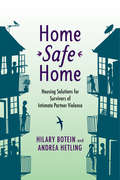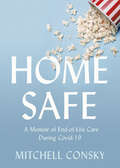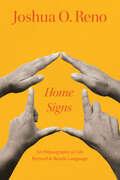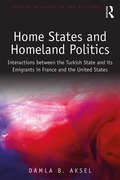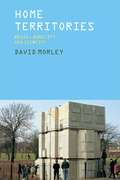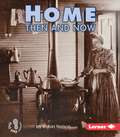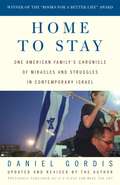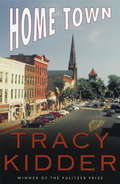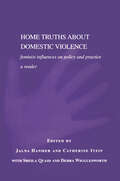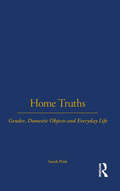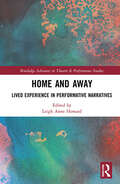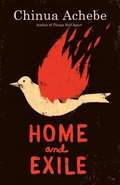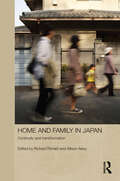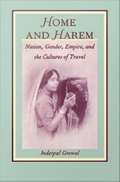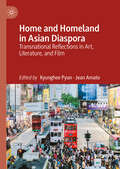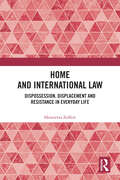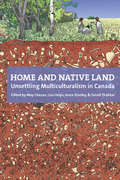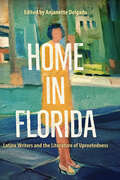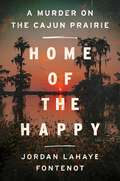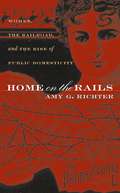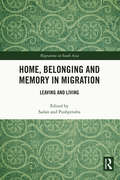- Table View
- List View
Home Safe Home: Housing Solutions for Survivors of Intimate Partner Violence
by Andrea Hetling Carol Corden Hilary BoteinHousing matters for everyone, as it provides shelter, security, privacy, and stability. For survivors of intimate partner violence (IPV), housing takes on an additional meaning; it is the key to establishing a new life, free from abuse. IPV survivors often face such inadequate housing options, however, that they must make excruciating choices between cycling through temporary shelters, becoming homeless, or returning to their abusers. Home Safe Home offers a multifaceted analysis that accounts for both IPV survivors' needs and the practical challenges involved in providing them with adequate permanent housing. Incorporating the varied perspectives of the numerous housing providers, activists, policymakers, and researchers who have a stake in these issues, the book also lets IPV survivors have their say, expressing their views on what housing and services can best meet their short and long-term goals. Researchers Hilary Botein and Andrea Hetling not only examine the federal and state policies and funding programs determining housing for IPV survivors, but also provide detailed case studies that put a human face on these policy issues. As it traces how housing options and support mechanisms for IPV survivors have evolved over time, Home Safe Home also offers innovative suggestions for how policymakers and advocates might work together to better meet the needs of this vulnerable population.
Home Safe: A Memoir of End-of-Life Care During Covid-19
by Mitchell ConskyDuring a pandemic lockdown full of pyjama dance parties, life talks, and final goodbyes, a family helps a father die with dignity.In April 2020, journalist Mitchell Consky received bad news: his father was diagnosed with a rare and terminal cancer, with less than two months to live. Suddenly, he and his extended family — many of them healthcare workers — were tasked with reconciling the social distancing required by the Covid-19 pandemic with a family-based approach to end-of-life care. The result was a home hospice during the first lockdown. Suspended within the chaos of medication and treatments were dance parties, episodes of Tiger King, and his father’s many deadpan jokes. Leaning into his journalistic intuitions, Mitchell interviewed his father daily, making audio recordings of final talks, emotional goodbyes, and the unexpected laughter that filled his father’s final days. Serving as a catalyst for fatherly affection, these interviews became an opportunity for emotional confession during the slowed-down time of a shuttered world, and reflect how far a family went in making a dying loved one feel safe at home.
Home Signs: An Ethnography of Life beyond and beside Language
by Joshua O. RenoAn intimate account of an anthropologist’s relationship with his non-verbal son and how it has shaped and transformed his understanding of closeness and communication. Home Signs grew out of the anthropologist Joshua Reno’s experience of caring for and trying to communicate with his teenage son, Charlie, who cannot speak. To manage interactions with others, Charlie uses what are known as “home signs,” gestures developed to meet his need for expression, ranging from the wiggle of a finger to a subtle sideways glance. Though he is nonverbal, he is far from silent: in fact, he is in constant communication with others. In this intimate reflection on language, disability, and togetherness, the author invites us into his and Charlie’s shared world. Combining portraits of family life and interviews with other caregivers, Reno upends several assumptions, especially the idea that people who seem not to be able to speak for themselves need others to speak on their behalf. With its broad exploration of nonverbal communication in both human and nonhuman contexts, Home Signs challenges us to think harder about what it means to lead a “normal” life and to connect with another person.
Home States and Homeland Politics: Interactions between the Turkish State and its Emigrants in France and the United States (Studies in Migration and Diaspora)
by Damla B. AkselThis book draws on the literatures of transnationalism and diaspora studies to explore the ways in which the policies of emigrant-sending countries have an influence on how emigrants politically engage on issues related to their homelands. Drawing on over one hundred interviews with policy makers, diplomats, bureaucrats, members of civil society and academics in Turkey, France and the United States, it offers a comparison of the engagement of Turkish migrants with political issues in Turkey in periods both before and after home state policies have been constructed with a view to engaging emigrants. As such, it will appeal to scholars of sociology and politics with interests in diaspora and the engagement of migrants with political issues in their countries of origin.
Home Territories: Media, Mobility and Identity (Comedia)
by David MorleyHome Territories examines how traditional ideas of home, homeland and nation have been destabilised both by new patterns of migration and by new communication technologies which routinely transgress the symbolic boundaries around both the private household and the nation state. David Morley analyses the varieties of exile, diaspora, displacement, connectedness, mobility experienced by members of social groups, and relates the micro structures of the home, the family and the domestic realm, to contemporary debates about the nation, community and cultural identities. He explores issues such as the role of gender in the construction of domesticity, and the conflation of ideas of maternity and home, and engages with recent debates about the 'territorialisation of culture'.
Home Theater Hacks
by Brett MclaughlinIt might be the long lines at the theater, the $4.00 for a small bag of popcorn, or the cutting-edge technology that's now so readily available to the home market. Whatever the reason, the home theater market today is booming like the soundtrack to Star Wars! Want proof? A Google search for home theater reveals over three million results. Yikes! It's simply undeniable: More and more people prefer watching their favorite movies, television shows, and videos from the comfort of their own sofas and couches. What's also undeniable is the inexperience of most people who choose to install or upgrade their home theaters. Until now, the knowledge, technique, and experiences of those who've encountered similar conditions to yours could only be accessed through laborious web searches, stacks of magazines, and water cooler conversations. Home Theater Hacks from O'Reilly is the perfect remedy for this group. A smart collection of insider tips and tricks, Home Theater Hacks covers home theater installation from start to finish, purchase to experience. Just imagine: no frustrating trial-and-error process and better yet, no expensive appointments with installation experts. Home Theater Hacks prevents both by imparting down-and-dirty technique not found anywhere else. The book begins with a quick glossary of terms so you can speak the lingo when you go shopping, and then dives right into hush-hush, insider tricks. It's all covered where to find the right audio and video components, how to deal with speakers and wiring, understanding cable connectivity, mastering remote controls, how to fully grasp TiVo, and so much more. And to top it off, each of these insider tips is presented in a concise yet delightfully entertaining style. Bringing the Jurassic Park dinosaurs into your living room has never been so easy! A seasoned veteran with numerous O'Reilly titles under his belt, author Brett McLaughlin leaves no stone unturned in helping you customize your home theater experience to your own personal environment.
Home Then and Now (First Step Nonfiction -- Then And Now Ser.)
by Robin NelsonPresents a brief look at how homes in the United States have changed over the years.
Home To Stay: One American Family's Chronicle of Miracles and Struggles in Contemporary Israel
by Daniel GordisIn the summer of 1998, Daniel Gordis and his family moved to Israel from Los Angeles. They planned to be there for a year, but a few months into their stay, Gordis and his wife decided to remain in Jerusalem permanently, confident that their children would be among the first generation of Israelis to grow up in peace. Immediately after arriving in Israel, Daniel had started sending out e-mails about his life to friends and family abroad. These missives—passionate, thoughtful, beautifully written, and informative—began reaching a much broader readership than he’d ever envisioned, eventually being excerpted inThe New York Times Magazineto much acclaim. An edited and finely crafted collection of his original e-mails,Home to Stayis a first-person, immediate account of Israel’s post-Oslo meltdown that cuts through the rhetoric and stridency of most dispatches from that country or from the international media. This is must reading for anyone who wants to get a firsthand, personal view of what it’s like for a family on the front lines of war.
Home Town
by Tracy KidderIn this splendid book, one of America's masters of nonfiction takes us home--into Hometown, U.S.A., the town of Northampton, Massachusetts, and into the extraordinary, and the ordinary, lives that people live there. <P><P>As Tracy Kidder reveals how, beneath its amiable surface, a small town is a place of startling complexity, he also explores what it takes to make a modern small city a success story. <P>Weaving together compelling stories of individual lives, delving into a rich and varied past, moving among all the levels of Northampton's social hierarchy, Kidder reveals the sheer abundance of life contained within a town's narrow boundaries. <P>Does the kind of small town that many Americans came from, and long for, still exist? <P> Kidder says yes, although not quite in the form we may imagine. <P>A book about civilization in microcosm, Home Town makes us marvel afresh at the wonder of individuality, creativity, and civic order--how a disparate group of individuals can find common cause and a code of values that transforms a place into a home. And this book makes you feel you live there.
Home Truths About Domestic Violence: Feminist Influences on Policy and Practice - A Reader
by Jalna Hanmer Catherine ItzinWhile men's violence to women is an everyday culturally supported activity, this reader demonstrates: that men's violence can be curtailed and that women and children can be assisted effectively; that state policies and provision can be improved; and that women can actively participate in the resolution of their difficulties. Bringing together new work and key papers Home Truths About Domestic Violence provides a comprehensive overview and up-to-date account of the progress so far, and identifies what still needs to be done. Areas covered include: * womens experience of violence * childrens experience of violence * personal experiences of the justice system * state policies on violence in the US and UK * educational programmes and initiatives. This substantial Reader makes a significant contribution to the understanding of domestic violence from both a policy and a practice perspective. Together with its companion volume Home Truths About Child Sexual Abuse it provides an in-depth resource for a wide range of teachers, students and professionals, highlighting the diverse and complex dimensions of the problem of domestic violence.
Home Truths: Gender, Domestic Objects and Everyday Life
by Sarah PinkHomes are powerfully defined by smells, sounds, textures and objects, all of which reflect how people live their everyday lives. From spray-painting the toilet wall to relaxing in the bath, the products we use speak volumes about who we are, how we relate to others and who we want to be. Based on extensive fieldwork, this fascinating book explores the intimate, material and sensory spaces of the home to uncover how gender roles are performed within our personal, private worlds. Pink shows how everyday items ranging from perfumes to soap powder imprint and reinforce daily experiences and a sense of identity. How has the home been affected by the fact that more and more women now go to work and increasingly more men spend time engaged in domestic tasks? How do more traditional family-centred homes compare with those belonging to diverse family forms and people living alone? What does a study of domestic gender tell us about how change occurs? Answering these questions and many more, Pink combines the most recent approaches in gender studies and material culture to show how everyday activities can be deeply revealing of gender roles in the 21st century.
Home Visiting: Procedures for Helping Families (Second Edition)
by Dr Donna Bryant Barbara Hanna WasikThis Second Edition is a good source for those training to be home visitors, in-service home visitors, supervisors and directors of home visiting programs serving a wide range of families. Recent evaluations of home visiting are summarized and practical suggestions for evaluating local programs are also included. This is an easy to read and essential resource for both beginning and experienced home visitors, trainers, supervisors of home visitors, and directors of home visiting programs.
Home and Away: Lived Experience in Performative Narratives (Routledge Advances in Theatre & Performance Studies)
by Leigh Anne HowardHome and Away explores how performative writing serve as a process that critically interrogates space/place in relation to personal, social, cultural, and political understanding. By combining aesthetic expression and inquiry with critical reflection, the contributors in this volume use a variety of narrative strategies—autoethnography, mystoriography, creative cartography, the lyric essay, fictocriticism, collage, the screenplay, and poetics—to position place as the starting point for the aesthetic impulse. The anthology showcases the power and potential of performative writing to illustrate the ways we interact with and in place; provides examples of the ways one can express lived experience; and demonstrates the ways discourses overlap while extending our understanding of identity and place, whether one is home or away. Although the chapters are fixed by their literary form in this volume, many of chapters are best realized in a performance or shared publicly via an oral tradition. This collection will be of great interest to students and scholars in performance, communication studies, and literature.
Home and Exile
by Chinua AchebeMore personally revealing than anything Achebe has written, "Home and Exile"--the great Nigerian novelist's first book in more than ten years--is a major statement on the importance of stories as real sources of power, especially for those whose stories have traditionally been told by outsiders. In three elegant essays, Achebe seeks to rescue African culture from narratives written about it by Europeans. Looking through the prism of his experiences as a student in English schools in Nigeria, he provides devastating examples of European cultural imperialism. He examines the impact that his novel "Things Fall Apart" had on efforts to reclaim Africa's story. And he argues for the importance of writing and living the African experience because, he believes, Africa needs stories told by Africans.
Home and Family in Japan: Continuity and Transformation (Japan Anthropology Workshop Series)
by Richard Ronald Allison AlexyIn the Japanese language the word ‘ie’ denotes both the materiality of homes and family relations within. The traditional family and family house - often portrayed in ideal terms as key foundations of Japanese culture and society - have been subject to significant changes in recent years. This book comprehensively addresses various aspects of family life and dwelling spaces, exploring how homes, household patterns and kin relations are reacting to contemporary social, economic and urban transformations, and the degree to which traditional patterns of both houses and households are changing. The book contextualises the shift from the hegemonic post-war image of standard family life, to the nuclear family and to a situation now where Japanese homes are more likely to include unmarried singles; childless couples; divorcees; unmarried adult children and elderly relatives either living alone or in nursing homes. It discusses how these new patterns are both reinforcing and challenging typical understandings of Japanese family life.
Home and Harem: Nation, Gender, Empire, and the Cultures of Travel
by Inderpal GrewalMoving across academic disciplines, geographical boundaries, and literary genres, Home and Harem examines how travel shaped ideas about culture and nation in nineteenth-century imperialist England and colonial India. Inderpal Grewal's study of the narratives and discourses of travel reveals the ways in which the colonial encounter created linked yet distinct constructs of nation and gender and explores the impact of this encounter on both English and Indian men and women. Reworking colonial discourse studies to include both sides of the colonial divide, this work is also the first to discuss Indian women traveling West as well as English women touring the East. In her look at England, Grewal draws on nineteenth-century aesthetics, landscape art, and debates about women's suffrage and working-class education to show how all social classes, not only the privileged, were educated and influenced by imperialist travel narratives. By examining diverse forms of Indian travel to the West and its colonies and focusing on forms of modernity offered by colonial notions of travel, she explores how Indian men and women adopted and appropriated aspects of European travel discourse, particularly the set of oppositions between self and other, East and West, home and abroad. Rather than being simply comparative, Home and Harem is a transnational cultural study of the interaction of ideas between two cultures. Addressing theoretical and methodological developments across a wide range of fields, this highly interdisciplinary work will interest scholars in the fields of postcolonial and cultural studies, feminist studies, English literature, South Asian studies, and comparative literature.
Home and Homeland in Asian Diaspora: Transnational Reflections in Art, Literature, and Film
by Kyunghee Pyun Jean AmatoWhile many of us may strive to locate a sense of identity and belonging expressed via a home or ancestral homeland; today, however, this connection is no longer, if it ever was, a straightforward identification. This collection aims at mapping narratives or artwork of home/homeland that present shared, private, multifaceted, and often contested experiences of place, especially in the context of today’s migrations and upheavals, along with alarming degrees of increased nativism, racism, and anti-Asian violence. This volume includes papers by artists, filmmakers, and comparative scholars from diverse disciplines of literature, cinema, art history, cultural studies, and gender studies. Our goal is to help literary and art historian scholars in Asian diaspora studies, better decolonize and open up traditional research methodologies, curricula, and pedagogies.
Home and International Law: Dispossession, Displacement and Resistance in Everyday Life
by Henrietta ZeffertThis book is about home and international law. More specifically, it is about the profound, and frequently devastating, transformations of home that are happening almost everywhere in the world today and what international law has to do with them. Through three stories of home – the desert home, the lake home and the city home – this book traces how the everyday operations of international law shape the material, affective and imaginative experience of home. It argues that international law’s ‘homemaking work’ is characterised by acts of domination, practices of resistance and the production of unhomely spaces. However, the book also considers whether and how the liberatory potential of international law could be unlocked through the metaphor of home. This book draws from fieldwork conducted by the author in Palestine, Cambodia and the United Kingdom. It takes a global socio-legal approach to home and international law, informed by feminist political theory, feminist geography, home studies and contemporary critical approaches to international law. It is the first academic work to examine the relationship between home and international law. This book’s global socio-legal approach to home and international law will be of interest to those teaching and studying in international law, socio-legal studies, legal pluralism and legal geography.
Home and Nation in British Literature from the English to the French Revolutions
by Cousins, A. D. and Payne, Geoffrey A. d. Cousins Geoffrey PayneIn a world of conflicting nationalist claims, mass displacements and asylum-seeking, a great many people are looking for 'home' or struggling to establish the 'nation'. These were also important preoccupations between the English and the French revolutions: a period when Britain was first at war within itself, then achieved a confident if precarious equilibrium, and finally seemed to have come once more to the edge of overthrow. In the century and a half between revolution experienced and revolution observed, the impulse to identify or implicitly appropriate home and nation was elemental to British literature. This wide-ranging study by international scholars provides an innovative and thorough account of writings that vigorously contested notions and images of the nation and of private domestic space within it, tracing the larger patterns of debate, while at the same time exploring how particular writers situated themselves within it and gave it shape.
Home and Native Land: Unsettling Multiculturalism in Canada
by May Chazan, Lisa Helps, Anna Stanley, & Sonali ThakkarHome and Native Land takes its vastly important topic and places it under a new, penetrating light–shifting focus from the present grounds of debate onto a more critical terrain. The book’s articles, by some of the foremost critical thinkers and activists on issues of difference, diversity, and Canadian policy, challenge sedimented thinking on the subject of multiculturalism. Not merely “another book” on race relations, national identity, or the post 9-11 security environment, this collection forges new and innovative connections by examining how multiculturalism relates to issues of migration, security, labour, environment, nature, and land. These novel pairings illustrate the continued power, limitations, and, at times, destructiveness of multiculturalism, both as policy and as discourse.
Home in Florida: Latinx Writers and the Literature of Uprootedness
by Anjanette DelgadoA powerful collection of contemporary voices Showcasing a variety of voices shaped in and by a place that has been for them a crossroads and a land of contradictions, Home in Florida presents a selection of the best literature of displacement and uprootedness by some of the most talented contemporary Latinx writers who have called Florida home. Featuring fiction, nonfiction, and poetry by Richard Blanco, Jaquira Díaz, Patricia Engel, Jennine Capó Crucet, Reinaldo Arenas, Judith Ortiz Cofer, and many others, this collection of renowned and award-winning contributors includes several who are celebrated in their countries of origin but have not yet been discovered by readers in the United States. The writers in this volume—first- , second- , and third-generation immigrants to Florida from Cuba, Mexico, Honduras, Perú, Argentina, Chile, and other countries—reflect the diversity of Latinx experiences across the state. Editor Anjanette Delgado characterizes the work in this collection as literature of uprootedness, literatura del desarraigo, a Spanish literary tradition and a term used by Reinaldo Arenas. With the heart-changing, here-and-there perspective of attempting life in environments not their own, these writers portray many different responses to displacement, each occupying their own unique place on what Delgado calls a spectrum of belonging. Together, these writers explore what exactly makes Florida home for those struggling between memory and presence. In these works, as it is for many people seeking to make a new life in the United States, Florida is the place where the uprooted stop to catch their breath long enough to wonder, “What if I stayed? What if here could one day be my home?”
Home in the City
by Alan B. AndersonDuring the past several decades, the Aboriginal population of Canada has become so urbanized that today, the majority of First Nations and Métis people live in cities. Home in the City provides an in-depth analysis of urban Aboriginal housing, living conditions, issues, and trends. Based on extensive research, including interviews with more than three thousand residents, it allows for the emergence of a new, contemporary, and more realistic portrait of Aboriginal people in Canada's urban centres.Home on the City focuses on Saskatoon, which has both one of the highest proportions of Aboriginal residents in the country and the highest percentage of Aboriginal people living below the poverty line. While the book details negative aspects of urban Aboriginal life (such as persistent poverty, health problems, and racism), it also highlights many positive developments: the emergence of an Aboriginal middle class, inner-city renewal, innovative collaboration with municipal and community organizations, and more. Alan B. Anderson and the volume's contributors provide an important resource for understanding contemporary Aboriginal life in Canada.
Home of the Happy: A Murder on the Cajun Prairie
by Jordan LaHaye Fontenot"Riveting and atmospheric, Home of the Happy is also a heartfelt grappling with a trauma in the author’s family and her attempts to unravel its secrets once and for all. LaHaye Fontenot’s writing is urgent, fueled not just by a desire for justice but by love for her ancestors and the Cajun community of south Louisiana. A must-read for true crime and mystery fans."— Ana Reyes, New York Times bestselling author of The House in the PinesOn January 16, 1983, Aubrey LaHaye’s body was found floating in the Bayou Nezpique. His kidnapping ten days before sparked “the biggest manhunt in the history of Evangeline Parish.” But his descendants would hear the story as lore, in whispers of the dreadful day the FBI landed a helicopter in the family’s front lawn and set out on horseback to search for the seventy-year-old banker.Decades later, Aubrey’s great-granddaughter Jordan LaHaye Fontenot asked her father, the parish urologist, to tell the full story. He revealed that to this day, every few months, one of his patients will bring up his grandfather’s murder, and the man accused of killing him, John Brady Balfa, who remains at the Louisiana State Penitentiary at Angola serving a life sentence. They’ll say, in so many words: “Dr. Marcel, I really don’t think that Balfa boy killed your granddaddy.” For readers of Maggie Nelson’s The Red Parts and Emma Copley Eisenberg's The Third Rainbow Girl, Home of the Happy unravels the layers of suffering borne of this brutal crime—and investigates the mysteries that linger beneath generations of silence. Is it possible that an innocent man languishes in prison, still, wrongly convicted of murdering the author’s great-grandfather?
Home on the Rails
by Amy G. RichterRecognizing the railroad's importance as both symbol and experience in Victorian America, Amy G. Richter follows women travelers onto trains and considers the consequences of their presence there.For a time, Richter argues, nineteenth-century Americans imagined the public realm as a chaotic and dangerous place full of potential, where various groups came together, collided, and influenced one another, for better or worse. The example of the American railroad reveals how, by the beginning of the twentieth century, this image was replaced by one of a domesticated public realm--a public space in which both women and men increasingly strove to make themselves "at home."Through efforts that ranged from the homey touches of railroad car decor to advertising images celebrating female travelers and legal cases sanctioning gender-segregated spaces, travelers and railroad companies transformed the railroad from a place of risk and almost unlimited social mixing into one in which white men and women alleviated the stress of unpleasant social contact. Making themselves "at home" aboard the trains, white men and women domesticated the railroad for themselves and paved the way for a racially segregated and class-stratified public space that freed women from the home yet still preserved the railroad as a masculine domain.
Home, Belonging and Memory in Migration: Leaving and Living (Migrations in South Asia)
by Pushpendra SadanThis volume explores ideas of home, belonging and memory in migration through the social realities of leaving and living. It discusses themes and issues such as locating migrant subjectivities and belonging; sociability and wellbeing; the making of a village; bondage and seasonality; dislocation and domestic labour; women and work; gender and religion; Bhojpuri folksongs; folk music; experience; and the city to analyse the social and cultural dynamics of internal migration in India in historical perspectives. Departing from the dominant understanding of migration as an aberration impelled by economic factors, the book focuses on the centrality of migration in the making of society. Based on case studies from an array of geo-cultural regions from across India, the volume views migrants as active agents with their own determinations of selfhood and location. Part of the series Migrations in South Asia, this book will be useful to scholars and researchers of migration studies, refugee studies, gender studies, development studies, social work, political economy, social history, political studies, social and cultural anthropology, exclusion studies, sociology, and South Asian Studies.
